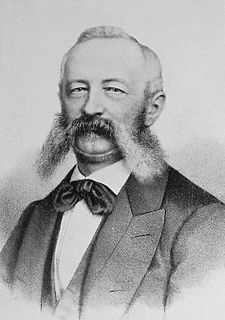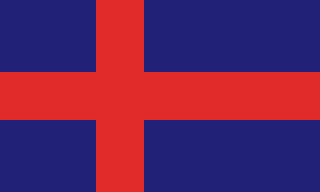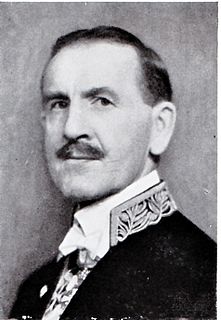Related Research Articles

Count is a historical title of nobility in certain European countries, varying in relative status, generally of middling rank in the hierarchy of nobility. The etymologically related English term "county" denoted the land owned by a count. Equivalents of the rank of count exist or have existed in the nobility structures of some non-European countries, such as hakushaku during the Japanese Imperial era.

Johan Ludvig Holstein, Lensgreve til Ledreborg was a Danish Minister of state from 1735 to 1751. The Danish colony Holsteinsborg on Greenland, was named after him.

General admiral was a Danish, Dutch, German, Russian, Portuguese, Spanish and Swedish naval rank. Its historic origin is a title high military or naval dignitaries of early modern Europe sometimes held, for example the (nominal) commander-in-chief of the Dutch Republic's navy.

Jarlsberg was a former countship that forms a part of today's Vestfold county in Norway.

Ludvig Henrik Carl Herman Holstein, Greve til Holsteinborg, was a Danish politician, landowner and noble. He was Council President of Denmark from 28 May 1870 to 14 July 1874 .

The Grand Duchy of Oldenburg was a grand duchy within the German Confederation, North German Confederation and German Empire that consisted of three widely separated territories: Oldenburg, Eutin and Birkenfeld. It ranked tenth among the German states and had one vote in the Bundesrat and three members in the Reichstag.

Danish nobility is a social class and a former estate in the Kingdom of Denmark. The nobility has official recognition in Denmark, a monarchy. Its legal privileges were abolished with the constitution of 1849. Some of the families still own and reside in castles or country houses. A minority of nobles still belong to the elite, and they are as such present at royal events where they hold court posts, are guests, or are objects of media coverage, for example Kanal 4's TV-hostess Caroline Fleming née Baroness Iuel-Brockdorff. Some of them own and manage companies or have leading positions within business, banking, diplomacy and NGOs.
The Danish order of precedence is a symbolic hierarchy of Danish officials used to direct protocol. It has no official status and entails no special privileges, but has been established in practical use, e.g. determining seating arrangements at formal occasions in the royal house. The order of precedence is very elaborate, and especially the lower classes include many relatively obscure civil servant positions; the following is only an excerpt.

Otto Joachim Moltke was the Minister of State of Denmark from 1824 to 1842.

Prince Aage, Count of Rosenborg, was a Danish prince and officer of the French Foreign Legion. He was born in Copenhagen the eldest child and son of Prince Valdemar of Denmark and Princess Marie d'Orléans.

Princess Caroline of Nassau-Usingen was the elder daughter of Karl Wilhelm, Prince of Nassau-Usingen, and wife of Landgrave Frederick of Hesse-Kassel.

Christian Conrad Sophus, Lensgreve Danneskiold-Samsøe was a Danish councillor, board member, landowner and magistrate.

Peder Anker, Count of Wedel-Jarlsberg was a Norwegian courtier, military officer and estate owner. He served as Lord Chamberlain for King Haakon VII of Norway from 1931 to 1945 and was one of the King's closest confidants for over thirty years. In 1946 he succeeded his brother as head of the house of Wedel-Jarlsberg and feudal count (lensgreve), the highest rank of the Dano-Norwegian nobility and equivalent to Duke in other countries.

Frederiksdal is a country house on the Furesø Lake north of Copenhagen, Denmark.

Gisselfeld, a former monastery, is Denmark's fifth-largest estate. Located between Haslev and Næstved, it extends into several municipalities but the main building is located in Braaby Parish in Faxe Municipality. The estate measures 3,850 hectares, including Hesede, Edelesminde, Brødebæk and Gødstrupgård, of which 2,400 hectares is forest. The three-storeyed Renaissance-style building has stepped gables, loopholes and a projecting tower over the main gate. The grounds include a moat, a well-kept park, lake, waterfall, gardens, greenhouse, and a fountain. A recent addition in its forest is a 45 meter tall hyperboloid tower.
Christian Rantzau was a Danish nobleman and civil servant. He served as Governor-general of Norway from 1731 to 1739.

Hans Schack,, was a member of the north German noble family Schack, who after many years in French service, entered the Danish service, made major contributions during the war with Sweden, and loyally supported Frederick III when he overthrew the Danish constitution. He became a Danish field-marshal, commander-in-chief of the Danish army, member of the Board of State, and of the Danish Privy Council, and made a Danish count.
Otto Didrik Schack, Count of Schackenborg was a Danish nobleman and feudal count. He was the first holder of the County of Schackenborg from 1676 to 1683.
The County of Schackenborg was a Danish and for a period German majorat in the southern part of Jutland, which existed from 1676 to 1924.
Otto Didrik Schack, Count of Schackenborg was a Danish nobleman and enfeoffed count. He was the third holder of the County of Schackenborg from 1719 to 1741.
References
- ↑ Lensgreve in 'The Danish Dictionary', retrieved 19/10 2019
- ↑ Ferdinand Christian Herman von Krogh: Den høiere danske Adel. En genealogisk Haandbog, C. Steen & søn, 1866